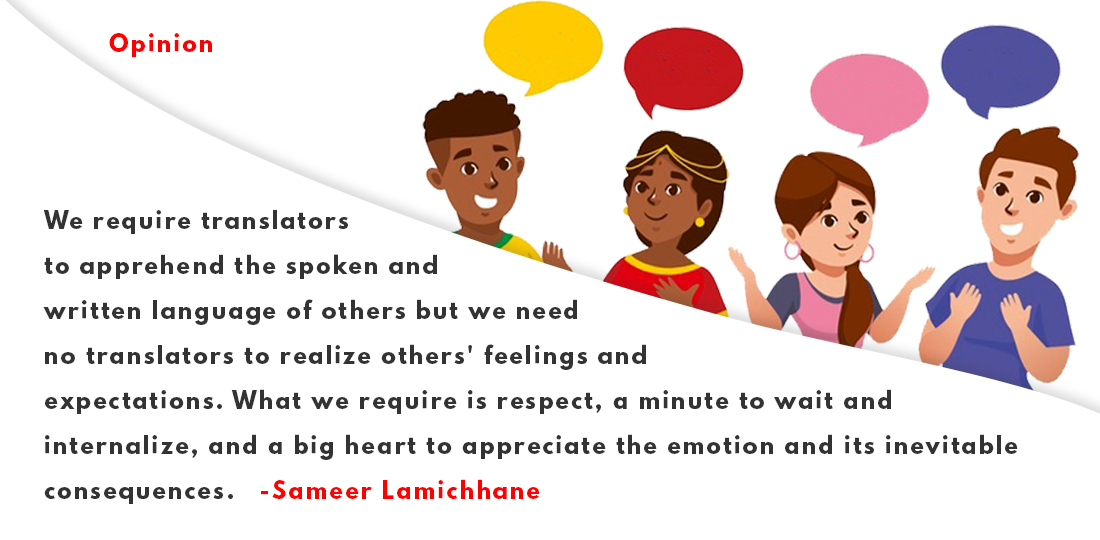One Language for All: Empathy

We require translators to apprehend the spoken and written language of others but we need no translators to realize others' feelings and expectations. What we require is respect, a minute to wait and internalize, and a big heart to appreciate the emotion and its inevitable consequences.
Recognition of human beings from the start of civilization has not been kindness alone. We have hunted, fought, won over, lost to and assimilated in various circumstances and epochs. No matter how we acted, we have been able to pull our ingenuity hitherto. Surpassing biological changes, migrating from unfavorable to favorable geographies, establishing groups and molding communities and societies, Homo Sapiens rules the planet, at least from our view.
The scientific community is still making studies on how human civilization has successfully written its history in the land. The more modern and technical we are getting, the more thorough findings we are making about ourselves. Apart from all the distinguishable differences from animals, we are specially built up with a cognitive capacity to mutually communicate- language.
Though debatable, there are nearly 8,000 spoken languages around the globe at present. Originating from the ability to imitate nature, more often considered the supreme gift of the creator, language is the richest characteristic that has helped us to convey ideas, spread messages and get organized with intent and plan. Historically, utterances and signs were registered as written symbols in Phoenician period which gradually got into scripts according to the places and people. Cultural values, traditions, innovations and discoveries are all but possible because of the standard function and contribution of language. Today, languages are also a matter of dominance, diplomacy and global relation. Each country attempts to make its national languages more flourished and recognized.
Language possesses core expressions of human feelings like love, anger, command, sympathy, apprehension et al. It won't be otherwise to say the coexistence of billions of people in the world is interwoven with exchange of ideas and understanding each other though we do not speak the same language. So, how do we all share singular human psychology and feeling of survival amidst distinct languages we speak and write? The only possible response could be - empathy!
Universal give and take are always not even since economic stratification determines the position of a specific clan or a community where countries locate themselves in different economic positions from rich to poor. But again, we are rich when we are tolerant, of course socially. As it is understood that war is inevitable for establishing peace, cruelty has also played an inevitable role while developing kindness inside us. The brutal past of our ancestors taught us the lesson of benevolence. Many chapters in the history of humankind will not have been written without anger, revenge and avenge. Periodic problems and intervallic complications were dealt with muscular and mechanical might in several stages of civilization.
But today, we all have understood, after fighting with each other and blaming each other that our singular challenge is eventually 'our own existence'. The greatest evil resides nowhere but within ourselves. Thus, to deal with this most updated problem, to mitigate this postmodern challenge, we are developing a natural principle of safeguarding, i.e. empathy. We humans can easily speculate the pathos and griefs of another member of the same kind. We require translators to apprehend the spoken and written language of others but we need no translators to realize others' feelings and expectations. What we require is respect, a minute to wait and internalize, and a big heart to appreciate the emotion and its inevitable consequences. Empathy is the unspoken yet tangible property of human language in common. A minor act of kindness values immensely in a dire drought of conciliation. Peace is brought via free and open arms not firearms, we have already understood. Stability and permanence is invited via justice and right, not conflict and might, we already accepted.
Technically, we articulate and craft thousands of languages, creoles and scripts and undoubtedly we will keep on doing so. At the same time, we are responsible to develop a universal language for all that does not demand school, paper, ink and keyboards, and empathy in us to prove that we humans are not only ruling the planet but are raring it with our emotion and mutual compassion.









Leave Comment